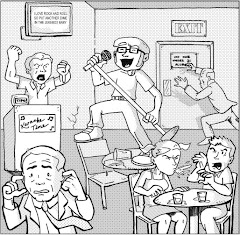Doom Town, 1999, Chick Publications
by Jack T. Chick
Of the two topics one should never discuss in public -- politics and religion -- A Comic A Day has successfully dodged the latter . . . not that my review of Captain Confederacy will ever top the Drudge Report, but, in their attempts to parallel "real life," comic books often incorporate politically driven subplots to create an air of social relevancy. Most of the time, this dynamic works; heck, Marvel's recent "Civil War" storyline was one long political allegory, if one actually believed Joe Quesada's hype from his appearance on The Colbert Report. Very few comics tread into religious territory; of course, Preacher tackled spiritual stereotypes head on, but rarely will superheroes (or cowboys, or emo rock stars, to cover a variety of genres here) find themselves in the midst of a religious subplot. Unless Daredevil or Spawn are perched atop some old church's cross, the topic is just too controversial to even casually explore in comics. Still, as an art that expresses to desires and conflicts of humanity, comic books cannot avoid religion entirely . . .
Enter Jack T. Chick.
While Jack Chick's classic "Chick tracts" are often perceived as extreme evangelist pamphlets first, they are in fact primarily minicomics, utilizing the visual sequential storytelling medium to convey the good news about Jesus Christ. Honestly, you don't have to a Christian to enjoy these little comics; in fact, Chick doesn't create these things for Christians at all. These modern allegories usually depict the plight of a heathen and their eventual conversion; for instance, the four tracts (each an average of twenty two-page panels, thus very easy to consume in mass quantities) I read today star a bully (in War Zone), an injured actor (in Fame), a homosexual (in Doom Town), and a Halloween haunted house attendee (in Happy Halloween), all of whom inevitably find themselves in the midst of a soul-searching crisis. The circumstance and dialogue are usually a bit extreme -- in Happy Halloween the crisis begins when a kid bolts from a haunted house and gets hit by a car -- but the introspection is real, an emotional struggle Chick believes is universal to everyone.
Heck, he's probably right.
Still, unless one is in the midst of one of these crises, or the spirit is really moving, I don't see how these tracts simply aren't anything more than chuckle-worthy. This review's specific issue, Doom Town, recreates the Biblical tale of Sodom and Gomorrah in a thinly veiled allegory to America's contemporary homosexual culture, and while Chick illustrates the modern gay crowd as leather-clad biker "bears," the Christian "hero" of this story, with his loose-collared button-up and thin Jim Dangle-like mustache, looks more realistically homosexual than anyone else. This guy prays for a homosexual to talk to and finds one within the same panel, later explaining to his target, "I really care about homosexuals, and I want them to know that they will face a horrible judgment." Yes, Chick doesn't pull any spiritual punches, and this tract is one of the more tender I've read. (In Fame, a hospital cleaning lady tells an ailing yet arrogant movie star, "Hasn't anyone ever told you that you're going to hell?") In a world where celebrity's are apologizing for their slips of the tongue every other day, Chick's hardcore Christianity is a refreshing breath of confident, even cocky belief, whether you buy it or not.
Further, Jack Chick is an incredible artist, plain and simple. Some of his tracts are illustrated in a Mad Magazine caricature style, perhaps intended to parallel the goofiness of their hedonistic anti-heroes, some of whom are caricatures of society itself. Doom Town has a different air about it; seemingly painted in water color, this issue boasts a rich depth in its design, an almost Alex Ross-like quality to it. ("Kingdom come," indeed!) If the Sodom and Gomorrah flashback had been rendered in that Mad style, I wouldn't have taken it as seriously; the rich grayscale of this other style truly expressed a respect for this Biblical account, conveying Lot's struggle with a harsh realism that contrasted his outrageous objective. (If you don't know the tale, Lot must find at least five decent people in his town of Sodom in order to spare it the Lord's wrath, but when a pair of angels visit the vexed believer, every man in town demand that Lot offer them forth so they can have sex with them. Those must have been some good looking angels.) As an artist, Jack Chick does that old adage justice, that he could've used his talents "for the forces of good or evil." I guess only you can decide which side he's on, but he's unabashed in taking that side, either way.
So, picture those Scary Art fellows to my left, some Kirby monsters to my right, and the Chick tract booth staring me down from across the aisle at last weekend's Alternative Press Expo. That should give you a sense of the sheer diversity that small press con offers its attendees and exhibitors. Yes, those long hours between folks thumbing through our comics are introspective enough, but to have Jack Chick's material promising an eternity in hell if I continue my current comics-centric lifestyle . . . I initially wondered why Chick tracts would be so popular at APE in the first place. Then I realized. "When in Rome . . ."
Saturday, April 28, 2007
Subscribe to:
Post Comments (Atom)



1 comment:
Jesus defines sin as lack of love. What is unloving about homosexuality? He surely condemns the unloving adulteries and perversions of straight men with women as described in Leviticus 18:6-22 and Romans 1:26-27. Gay men do not have sex with women.
Post a Comment